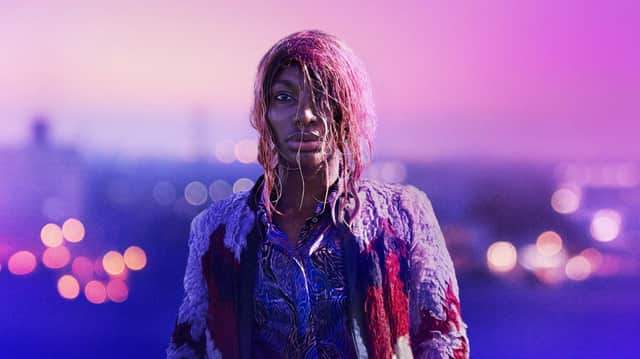Mesmerising Michaela Coel destroys critics of BBC’s cultural diversity push: Anthony Clavane


The huge success of her BBC drama series I May Destroy You seems to suggest the scrabbling has paid off.
Some of the best TV shows of the last couple of years have majored on misfits – Fleabag, Derry Girls, Normal People and Sex Education to name four – and it is clear that the policy of commissioning alternative voices is not, as the anti-woke brigade often proclaim, another example of “political correctness gone mad”.
Advertisement
Hide AdAdvertisement
Hide AdToo often, the critics of such a policy are allowed to get away with their “dull-but-worthy” moans. By all means, they bleat, produce drama that represents a cross-section of society, that gives a voice to those not being heard in mainstream media, that exposes the inequalities, bigotries and injustices in society. But don’t expect it to be any good.
Whenever there is a diversity debate in the television and film industry, the usual suspects line up to attack the so-called cultural biases of the “metropolitan elite”.
Whether it is the BBC pledging £100m to increasing on-air inclusivity in the next three years or, closer to home, Screen Yorkshire offering a free training scheme to young people from a diverse range of backgrounds, there are always grumblings about identity politics.
Longstanding critics like the Daily Telegraph’s Simon Heffer and Charles Moore have, oh so predictably, gone into battle with the Beeb; the former accused the corporation of pushing “woke propaganda not entertainment” and the latter claimed its “weakness masquerading as liberal virtue” had been a problem since the 1960s.
Advertisement
Hide AdAdvertisement
Hide Ad“Has anyone at the BBC or in the wider TV industry,” asked Fraser Myers of Spiked website, “ever stopped to ask if they actually have a diversity problem?”
Bruce Newsome, a lecturer in international relations and contributor to The Conservative Woman believes “the British media’s quest for diversity is producing content that is boring, repetitive, predictable, hypocritically prejudicial, and (ironically) unpopular”.
The answer to Myers’ question is “yes”, of course. The TV industry does have a diversity problem. As does the creative arts sector as a whole. To take the film business as an example, Black and minority ethnic workers represent only 4.4 per cent of the workforce.
In music, and the performing and visual arts, just less than 5 per cent come from such backgrounds – and in museums and galleries the figure drops to an alarming 2.7 per cent.
Advertisement
Hide AdAdvertisement
Hide AdAnd on Newsome’s point, as anyone who has seen I May Destroy You will testify, Coel’s series is a tour de force. Critically acclaimed on both sides of the Atlantic – New York Magazine deemed it “the most sublimely unsettling show of the year” – it is arguably the biggest TV hit of lockdown.
It is not the easiest of watches. Coel’s protagonist Arabella is drugged and sexually assaulted in a nightclub and subsequently reassesses, through her friendships and relationships, her ideas of consent. Yet the show displays a rare lightness of touch, blending dark humour, satire and cultural commentary into sequences which break the rules of conventional storytelling.
Although completed before the pandemic, it taps into a more intimate approach to creativity that has, of necessity, been showcased during the Covid-19 era.
One of the few silver linings of lockdown, where a great deal of television and film production has come to a halt, has been the absence of CGI, set-piece scenes or popcorn blockbusters. From Alan Bennett’s rebooted Talking Heads to Michael Sheen and David Tennant’s self-deprecating comedy Staged, there has been a welcome proliferation of artist-driven content, with high production values replaced by more nuanced takes on the contradictions of human existence.
Advertisement
Hide AdAdvertisement
Hide AdThe mesmerising I May Destroy You itself destroys, in one fell swoop, the dull-but-worthy critique of cultural diversity. The search for new, diverse, misfit voices must continue.
“We have a duty to develop new talent,” as Idris Elba points out, “so that more people like me can tell you our stories. Storytelling helps us understand each other better, and understanding each other better is the best hope we have.”
Editor’s note: first and foremost - and rarely have I written down these words with more sincerity - I hope this finds you well.
Almost certainly you are here because you value the quality and the integrity of the journalism produced by The Yorkshire Post’s journalists - almost all of which live alongside you in Yorkshire, spending the wages they earn with Yorkshire businesses - who last year took this title to the industry watchdog’s Most Trusted Newspaper in Britain accolade.
Advertisement
Hide AdAdvertisement
Hide AdAnd that is why I must make an urgent request of you: as advertising revenue declines, your support becomes evermore crucial to the maintenance of the journalistic standards expected of The Yorkshire Post. If you can, safely, please buy a paper or take up a subscription. We want to continue to make you proud of Yorkshire’s National Newspaper but we are going to need your help.
Postal subscription copies can be ordered by calling 0330 4030066 or by emailing [email protected]. Vouchers, to be exchanged at retail sales outlets - our newsagents need you, too - can be subscribed to by contacting subscriptions on 0330 1235950 or by visiting www.localsubsplus.co.uk where you should select The Yorkshire Post from the list of titles available.
If you want to help right now, download our tablet app from the App / Play Stores. Every contribution you make helps to provide this county with the best regional journalism in the country.
Sincerely. Thank you.
James Mitchinson
Editor
Comment Guidelines
National World encourages reader discussion on our stories. User feedback, insights and back-and-forth exchanges add a rich layer of context to reporting. Please review our Community Guidelines before commenting.